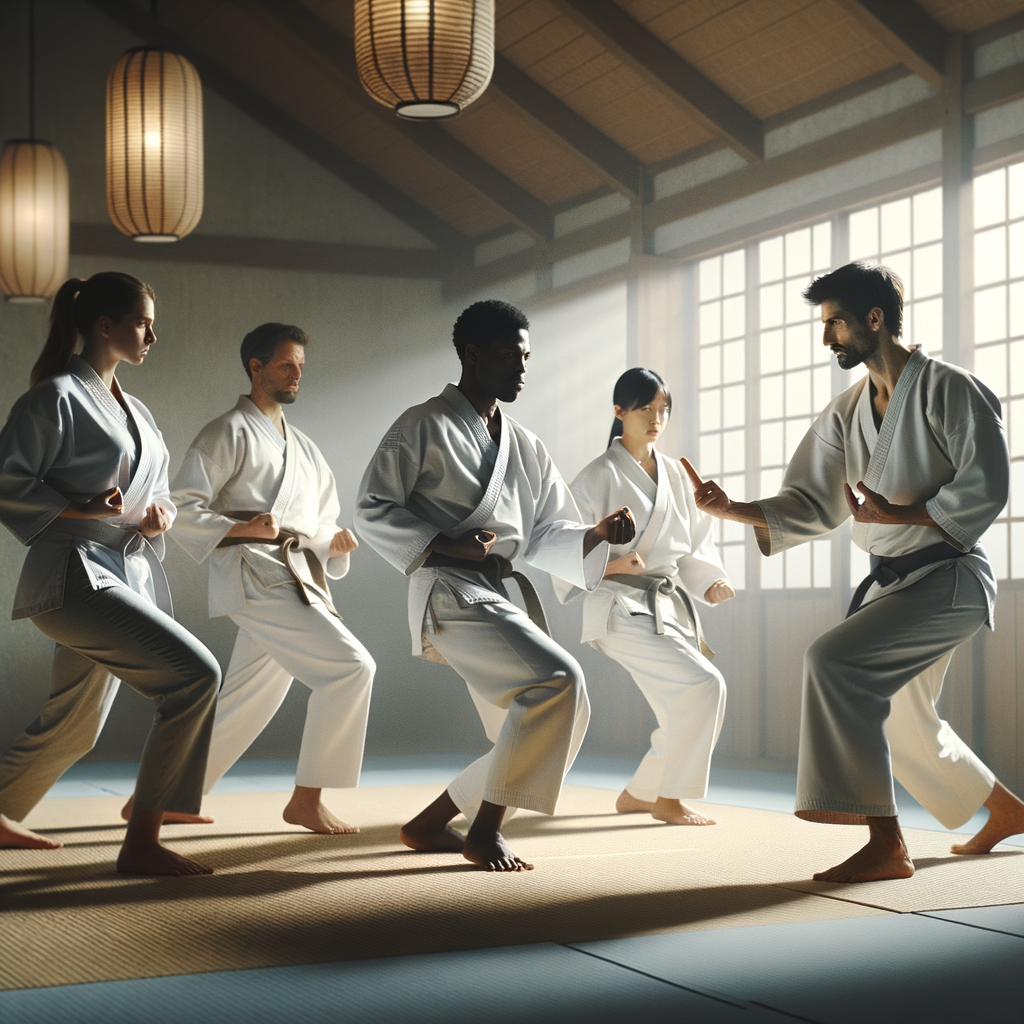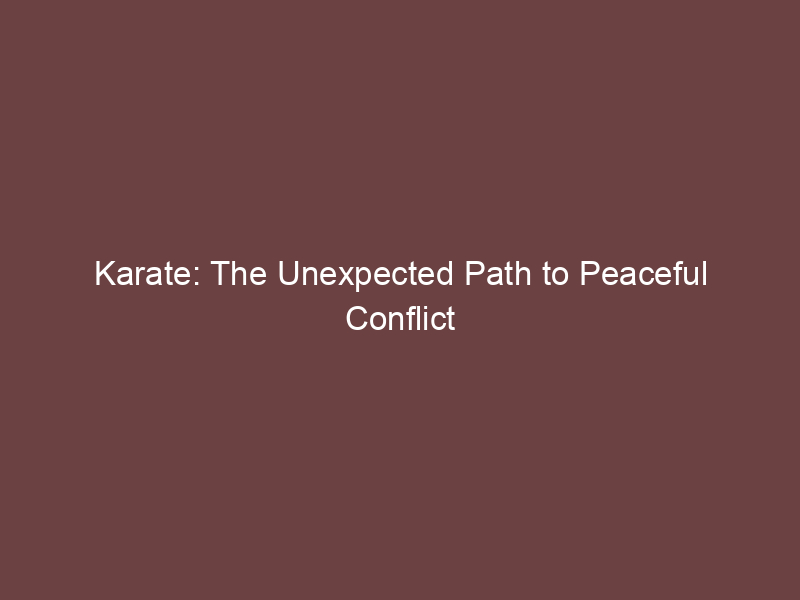
Introduction to Karate and Peaceful Conflict Resolution
Welcome to our exploration of Karate and its role in peaceful conflict resolution. This martial art, which originated in Okinawa, Japan, is not just about physical strength and agility. It also promotes peace and harmony, both within oneself and with others.
- Understanding the Concept of Karate
- Exploring the Link Between Karate and Peaceful Conflict Resolution
Karate is a martial art that combines physical techniques with mental discipline. It’s not just about fighting. It’s about respect, discipline, and self-control. The word “Karate” itself means “empty hand,” symbolizing that its practitioners are unarmed and use their bodies as the primary weapon. However, the true essence of Karate lies not in combat, but in building character and inner peace.
At first glance, it may seem odd to link a martial art like Karate with peaceful conflict resolution. However, the philosophy of Karate is deeply rooted in peace and respect for others. Karate teaches its practitioners to avoid conflict whenever possible and to use physical force only as a last resort. It encourages understanding, patience, and empathy, all of which are essential skills for resolving conflicts peacefully.
Throughout this blog post, we will delve deeper into the philosophy of Karate, explore the conflict resolution techniques it teaches, and share personal stories of finding peace through Karate. We hope that by the end, you will have a deeper understanding of how this martial art can be a tool for peace and harmony in your own life.
The Philosophy of Karate
The philosophy of Karate is much more than just a physical discipline. It is a way of life that promotes peace, harmony, and respect for oneself and others. Karate is not about fighting, but about finding peaceful solutions to conflicts and challenges.
Peaceful Solutions through Karate
Let’s delve deeper into how Karate fosters peace and harmony, and look at some real-life examples of peaceful solutions achieved through this martial art.
- How Karate promotes peace and harmony
- Examples of peaceful solutions achieved through Karate
Karate, at its core, is about self-control and discipline. It teaches its practitioners to be calm, composed, and respectful. The ultimate goal of Karate is not to learn how to fight, but to avoid fights altogether. It encourages peaceful resolution of conflicts, emphasizing the importance of harmony in our daily lives.
One of the key principles of Karate is “Kara” which means empty. This signifies the emptiness of the mind, free from anger, fear, and ego. This state of mind promotes peace and harmony, allowing practitioners to respond to conflicts with a clear and calm mind.
There are countless examples of how Karate has been used to promote peace and resolve conflicts. For instance, in a school setting, a student who practices Karate used his skills not to fight back against a bully, but to defuse the situation peacefully. He demonstrated self-control and respect, which eventually led the bully to back down.
Another example can be seen in a community where a local Karate dojo organized a peace march to promote unity and harmony. The dojo members, instead of showcasing their fighting skills, demonstrated their commitment to peace and respect for others.
In conclusion, the philosophy of Karate is deeply rooted in the principles of peace and harmony. It’s not just about the physical techniques, but about the mindset and the values it instills in its practitioners. Karate teaches us that the true strength lies not in conquering others, but in conquering oneself.
Conflict Resolution Techniques in Karate
Conflict resolution is a key part of any martial art, and karate is no exception. It’s not just about physical strength or agility; it’s about understanding and resolving conflicts in a peaceful manner. Let’s delve deeper into this topic.
Martial Arts and Peace
Martial arts, including karate, have always been associated with peace. They teach us how to control our emotions and avoid unnecessary conflicts. But how exactly does this work? Let’s explore.
- Understanding the philosophy of peace in martial arts
- How martial arts techniques can be used for peaceful conflict resolution
The philosophy of martial arts is deeply rooted in peace and harmony. Martial arts are not about fighting, but about finding a peaceful resolution to conflicts. They teach us to respect our opponents, control our emotions, and avoid unnecessary violence. This philosophy is reflected in every technique and practice in karate.
Every technique in karate is designed with the philosophy of peace in mind. For instance, the defensive techniques teach us to protect ourselves without causing harm to the opponent. The offensive techniques, on the other hand, are used only as a last resort and are aimed at disabling the opponent without causing serious injury.
So, karate is not just about physical strength or agility. It’s about understanding and resolving conflicts in a peaceful manner. It’s about learning to control our emotions and avoid unnecessary violence. And most importantly, it’s about respecting our opponents and treating them with dignity and respect.
Remember, the ultimate goal of karate is not to win fights, but to avoid them. And this is what makes it a perfect tool for peaceful conflict resolution.
| Key Points |
|---|
| The philosophy of martial arts is deeply rooted in peace and harmony. |
| Every technique in karate is designed with the philosophy of peace in mind. |
| The ultimate goal of karate is not to win fights, but to avoid them. |
Karate for Peace: A Practical Approach
Many people think of Karate as a way to defend oneself or as a form of physical exercise. But, did you know that Karate can also be a powerful tool for peace? Let’s explore this further.
Conflict Resolution Skills in Karate
One of the core principles of Karate is respect for others. This principle can be applied to resolve conflicts in a peaceful manner. Here are some key conflict resolution skills that can be developed through Karate:
- Active Listening: In Karate, students are taught to listen to their instructors carefully. This skill can be used in conflict resolution to understand the other person’s point of view.
- Self-Control: Karate requires a high level of self-discipline and control. This can help in managing emotions during conflicts.
- Respect for Others: Karate teaches respect for all individuals, irrespective of their abilities or backgrounds. This can promote empathy and understanding in conflict situations.
Now, let’s look at a real-life example of how these skills can be used to resolve conflicts peacefully.
Case Study: Using Karate for Peaceful Conflict Resolution in Real Life Situations
Consider the story of a 10-year-old boy named Tim. Tim was often involved in fights at school. His parents decided to enroll him in a Karate class, hoping it would help him channel his energy positively.
Over time, Tim learned to control his anger and listen to others. He started applying these skills at school. When conflicts arose, he would listen to the other person’s perspective and control his emotions. This led to a significant reduction in fights and improved his relationships with his peers.
This case study illustrates how Karate can be used as a practical approach to promote peace. By learning and applying the principles of Karate, we can resolve conflicts in a peaceful and respectful manner.
Finding Peace in Karate: A Personal Journey
Many people think of karate as a way to learn self-defense or to stay physically fit. But for some, it’s much more than that. It’s a journey towards inner peace and personal growth. Let’s dive into one such journey.
Martial Arts Conflict Resolution: A Case Study
Let’s explore the story of John, a middle-aged man who found peace and learned conflict resolution through karate.
- Personal experiences of finding peace through Karate
- How Karate can help in personal growth and conflict resolution
- Self-discipline: Karate teaches self-discipline, which can help you control your emotions and react calmly in stressful situations.
- Respect: In karate, respect for others is a fundamental principle. This can help you approach conflicts with an open mind and a willingness to understand the other person’s perspective.
- Patience: Karate requires patience and perseverance. These qualities can help you stay calm and composed during conflicts, and to seek peaceful solutions.
John was always a hot-tempered person. He would often get into arguments and conflicts, both at work and at home. One day, he decided to join a local karate class, hoping it would help him channel his anger. He was surprised to find that karate was not just about physical strength, but also about mental discipline and inner peace.
John learned to control his emotions, to stay calm in stressful situations, and to resolve conflicts peacefully. He found that the principles of karate – respect, patience, and discipline – were not just applicable in the dojo, but also in his everyday life.
John’s story is not unique. Many people have found that karate can help them grow personally and resolve conflicts peacefully. Here’s why:
In conclusion, karate is not just about physical strength. It’s a journey towards inner peace and personal growth. It teaches valuable life skills that can help you resolve conflicts peacefully and live a more balanced life.
Conclusion: Karate and Peaceful Solutions
In this article, we have explored the profound connection between Karate and peaceful conflict resolution. Let’s summarize the key points and discuss the future prospects of Karate as a tool for peace.
- Summarizing the role of Karate in peaceful conflict resolution
- Future prospects of Karate as a tool for peace
Throughout our journey, we have seen how Karate, far from being just a martial art, is a philosophy and a way of life that promotes peace and harmony. The principles of respect, discipline, and self-control taught in Karate are instrumental in resolving conflicts peacefully. These principles encourage individuals to manage their emotions, understand others, and seek non-violent solutions.
Case studies, such as the implementation of Karate programs in schools, have shown a significant decrease in bullying and an increase in mutual respect among students. This is a testament to Karate’s role in fostering a peaceful environment.
Looking ahead, the potential of Karate as a tool for peace is immense. As awareness about the peace-promoting aspects of Karate grows, we can expect to see more initiatives using Karate as a means to foster harmony and resolve conflicts.
For example, Karate could be integrated into community programs, corporate team-building activities, and even diplomatic relations. The universal language of Karate can bridge cultural gaps and promote understanding among diverse groups of people.
In conclusion, Karate is more than a physical discipline; it’s a philosophy that promotes peace and respect. By embracing the principles of Karate, we can contribute to a more peaceful world. As the famous Karate master Gichin Funakoshi once said, “The ultimate aim of Karate lies not in victory or defeat, but in the perfection of the character of its participants.”






